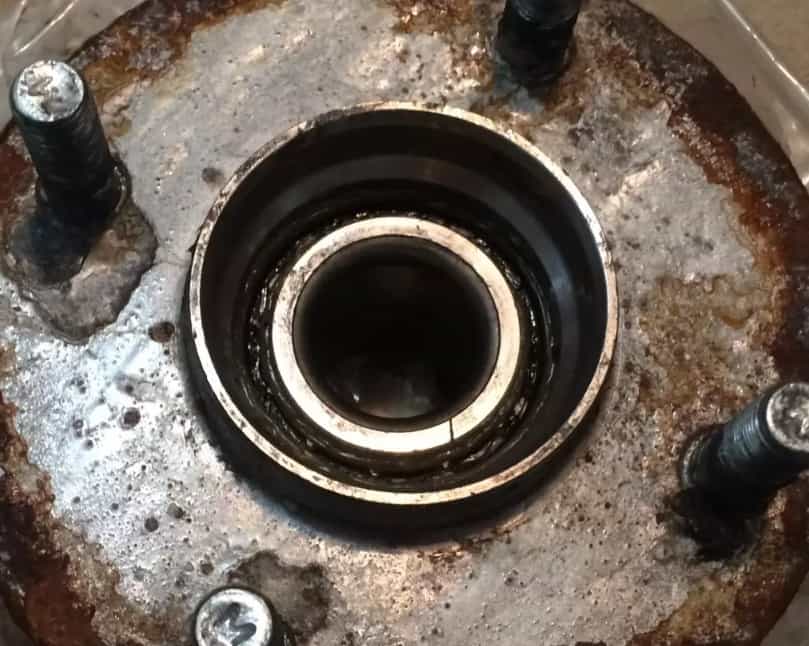Can a bad wheel bearing affect acceleration?
We have heard some people talk about having a bad wheel bearing and what this may do to their acceleration. For instance, you may have encountered problems with your vehicle at one point, which includes a faulty wheel bearing.
Although you may not be quite aware of the implication this may have to your car, it does have some issues to consider. This is why in this post, we will look into the effect of a bad wheel bearing on your car and if this impacts acceleration at all. Let’s jump right into it.

Contents
Can A Bad Wheel Bearing Affect Acceleration?
First, let us talk about wheel bearing. So basically, this refers to the plastic or rubber ring located between your wheel hub and wheel studs. This is an important part of your wheel, which also comes in contact with your rim. This component transmits force generation by the rotation of the wheel to the axle of your car.
Additionally, the wheel bearing makes it possible for your wheel to spin with ease. Therefore, there is no risk of hearing any grinding or squeaking sounds while you drive your car. Every vehicle also requires a wheel bearing, so it is necessary to ensure its good condition to prevent problems.
Now, when you have a faulty wheel bearing, the wheel tends to lose contact with the chassis of your vehicle. Therefore, the acceleration can be a bit gusty and slower than normal. But if you allow this to continue constantly and not get the problem fixed right away, this may result in the issue getting worse.
For example, upon starting your vehicle up, you may hear some rustling sounds, as well as hiccups and bumping, in addition to hesitation. Thus, if you really want to ensure the full potential of your vehicle, you need to have your wheel bearing issue addressed in a timely manner.
With all these things being said, let us look closely on the common concerns that come with a bad wheel bearing.
1. Start up difficulties
When you start your car, you may hear a rattling noise. This is because of the wheel bearings not being in a good condition. The sound can get even louder not only as you continue to run your vehicle but even more as you accelerate.
With this situation, it is important to have the wheel bearing serviced. If you hear the noise from your front wheel, it is possible that you have a faulty wheel bearing. This is why the noise only gets louder once you accelerate more. In this case, it is a sure sign that your vehicle is not performing as it should.
2. Shiftingness and hesitation
Another thing we would like to add is that hesitations when trying to start your vehicle is one clear sign that you have faulty wheel bearings. This is more apparent when driving at a low speed. However, it can also happen at a higher speed when you do emergency braking.
As you continue to drive further, you will notice the noise gets even worse. Acceleration tends to be jerky and you will also hear some engine noise. This is why it is pertinent to have your wheel bearing fixed sooner than later.
3. Slip from a speed
When you have bad wheel bearings, there is a noticeable reduction to the power and smoothness of your drive. This ends in a slip from speed, which is common when you are cornering, braking, or accelerating. As a result, there is a greater need to apply even more force on your steering. This is a way to address the poor direction of your car. In case you decide to postpone repair works to your wheel bearing, the issue only gets worse.
4. Hiccups or bumps
Do you hear an audible bumping sound each time you drive around a corner or when you brake? If so, you definitely have a bad wheel bearing. It also gets louder and worse if you ignore this problem and continue driving your car. So, if you start hearing bumping sounds, you need to have the wheel bearing serviced right away.
Additional Points to Consider
There are many reasons why you may have a wheel bearing failure problem. One of these is having an excessively worn bearing. If you run your car faster than what it can handle, the bearings will ultimately wear out. Poor maintenance is another thing that can impact excess wear, so it is important to have your brakes and wheels lubricated each time you check your vehicle.
Additionally, you may have not been using your car more. Or perhaps, it is not quite used to high speed driving. This is why the bearings should be fine. But in the case of an overly used car, the bearings can get worn out easily.
Read More: Common Blown Amp Symptoms To Know
Bottom Line
There are many signs that you have a bad wheel bearing. You should be able to tell quickly when you hear an odd noise each time you accelerate or when you are cornering and braking. This is why if these symptoms are present, do not delay any further the need to get your wheel bearing fixed. You should have the problem addressed sooner than later.
You may either have the bearing and the hub replaced yourself or have a specialist do this for you. It is usually a more complex task that requires more professional skills than simply changing the hub. So, it is best to go straight to the experts for the results you want.
Overall, make it a point to prioritize having your wheel bearing addressed by an expert and never disregard any signs of a wheel bearing this damage. This way, you will not end up compromising the lifespan of your wheel bearing and related parts and ensure the proper performance of your vehicle.